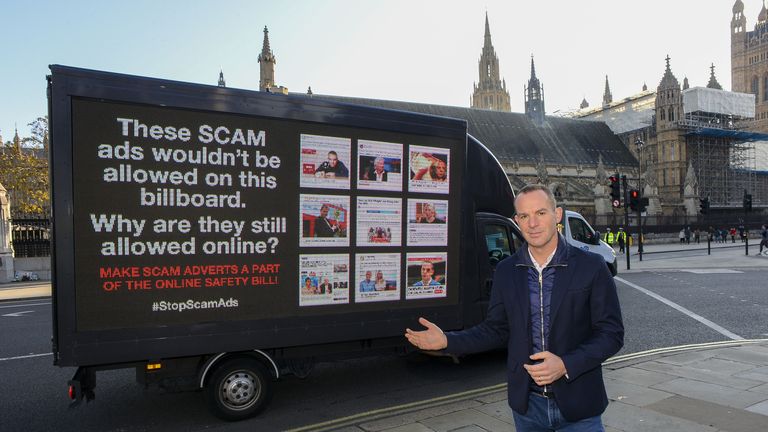Celebrities like Robbie Williams, Bear Grylls and Holly Willoughby have signed a letter led by Martin Lewis calling on the prime minister to take action on paid scam adverts.
The consumer champion has long campaigned against bogus ads using his face to lure users and wants tech giants to be held responsible under the upcoming Online Safety Bill.
While user-generated scams will be covered by the bill, as well as a wide range of areas such as terrorism and child sexual exploitation, paid scam advertising will not.
Mr Lewis has warned that the omission will make the problem worse, as paid advertising scams will be less regulated compared to free user generated fraud.
Sir Richard Branson, Phillip Schofield, Dawn French, Lorraine Kelly, Davina McCall, Bradley Walsh, Rob Brydon, as well as Dragon’s Den stars Deborah Meaden, Duncan Bannatyne and Peter Jones, are among the celebrities who have added their name to the letter to Boris Johnson.
Mr Lewis said: “It isn’t for me to fix this problem, it isn’t for Richard Branson or for Robbie Williams or Deborah Meaden, we are having our names ripped off to rip off vulnerable people.
“That’s why we have government and regulators, and this is an unpunished crime that people can get away with with impunity and it has to stop.
“People like Robbie, they care, in his case about his fans, that he doesn’t want them to be ripped off, because people trust him.”
The MoneySavingExpert.com founder, along with Virgin founder Sir Richard and businesswoman Ms Meaden are among some of the most-used faces in online fraud, according to Action Fraud and the National Cyber Security Centre (NCSC).
Sir Richard said: “We know there has been a sharp rise in scams since the start of the pandemic, and it’s deeply concerning that people may be tricked into parting with their money by someone pretending to be me.
“This is a global issue, and we are doing all we can to unmask scammers, but we can only do this by working together and ensuring the public are protected from these terrifyingly deceptive tactics.”
Ms Meaden said: “For too long, people have fallen victim to scams because they trusted that myself and others were behind these false ads.
“It’s not enough for us to warn people through the press and media, something needs to be done to stop the ads appearing in the first place.
“Online scam advertising must be regulated and it must be included in the Online Safety Bill.”
In October, Digital Secretary Nadine Dorries told MPs that she “would love to” include paid-for scam advertising in the Bill, but was prevented from doing so on “legal advice” received.
A government spokesperson said a response to the letter will be issued “in due course”.
They said: “We have been clear that online fraud is a huge problem and the government is continuing to explore additional legislative and non-legislative solutions to combat it.
“We’re looking into the entire issue of online advertising including whether tougher regulation is needed.”



